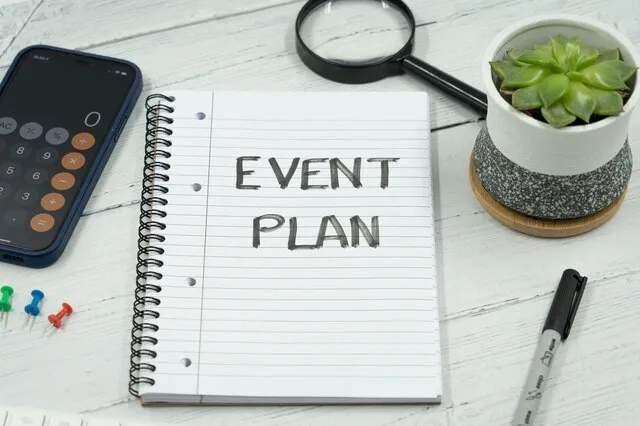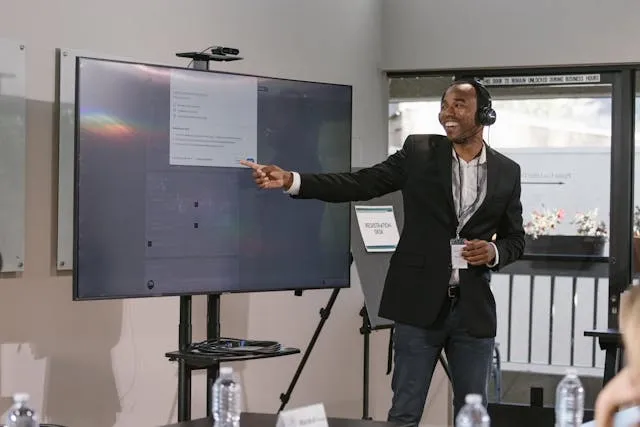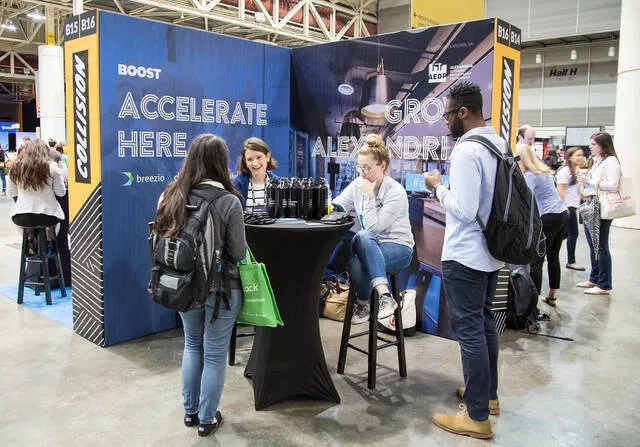Trade Show Management: Logistics, Budgeting And Event Planning Tips
Trade show management plays a key role in organizing and executing a successful event to connect businesses, exhibitors, and attendees. No matter the size of the event you are hosting, effective planning and execution are key to your success.
In this guide, we look at things like overseeing logistics, budgeting, marketing, and on-site coordination. Explore the essential aspects to create an engaging experience for participants, from budgeting to marketing strategies. Read on to get expert insights that will help you streamline the process.

Key Takeaways
- Trade show management takes meticulous planning, budgeting, and execution to ensure event success, and a well-designed marketing strategy is key.
- Proper logistics include venue selection and vendor coordination. These are critical considerations for seamless event operation.
- Budget effectively to control costs and use trade show management software to streamline planning.
- We supply high-quality custom trade show table covers made from polyester to ensure a cohesive and branded presence throughout the event space.
Trade Show Management
As the person organizing and managing a trade show, you need to cover the planning, execution, and evaluation of the event to ensure it runs smoothly. You will need to look at things like venue selection, vendor coordination, budgeting, marketing, and attendee engagement.
For businesses, trade shows are a valuable opportunity for things like:
- Showcasing products
- Networking with industry leaders
- Generating leads
Exhibitors need the trade show to be well-managed to ensure they have an effective platform to connect with potential partners and customers. Attendees, meanwhile, look for exposure to industry trends, new products, and opportunities to network. With successful trade show management, you enhance brand visibility, drive engagement, and maximize return on investment (ROI).
Explore strategies to enable businesses to leverage trade show participation to expand their market presence. Whether it is venue layout or custom trade show table covers with logos, every detail counts, so take the time to strategize fully.

How To Organize A Successful Trade Show?
To organize a successful trade show, your planning and execution is about much more than just how to stand out at the exhibition. Even for organizers, this is part of the planning, but let’s look at a step-by-step guide for a trade show from conception to execution:
- Define your objectives: Determine the trade show’s main goals, target audience, and key performance indicators (KPIs).
- Secure a venue: Choose the location based on accessibility, space requirements, and industry relevance.
- Set your budget: Outline the expected costs and allocate funds for things like the venue, marketing, staffing, and logistics.
- Create a marketing plan: Develop your strategy using email marketing, social media, and industry partnerships to attract exhibitors and attendees.
- Coordinate vendors and sponsors: Secure reliable partners for event essentials like booth setup, catering, and promotional materials.
- Plan the event schedule: Organize panel discussions, networking sessions, and product demonstrations for maximum engagement.
- Execute on-site management: Design a seamless check-in process, provide clear signage, and address all technical issues as they arise.
- Conduct post-event analysis: Once the event is over, gather feedback through surveys and measure your success against the predefined KPIs.
How Long Does It Take To Plan A Trade Show?
The time it takes to plan a trade show depends mainly on the size and complexity of the event in question. Let’s look at some timeframes for small, medium, and large events:
- Small trade shows (2-6 months): When you have fewer exhibitors and attendees, the planning timeline is shorter.
- Medium-sized trade shows (6-12 months): You will need more extensive logistics and marketing efforts, so more time is needed.
- Large trade shows (12-18 months): Major industry events with international participation require long-term planning.
Statistics show that 95% of exhibitors prefer ‘in-person’ to ‘virtual’ events, but these take more time. Factors that influence the planning duration include venue availability, exhibitor recruitment, sponsorship acquisition, and marketing campaign execution. Set clear deadlines and make use of project management tools to streamline things.

With our custom size tablecloths, you can create your own polyester trade show table cover that meets the precise size requirements and delivers a bespoke aesthetic.
How Much Does It Cost To Organize A Trade Show?
The amount it costs to organize a trade show varies depending on key factors like venue size, marketing efforts, and the scale of the event. Overall, you should expect to prepare a budget of anything from around $25,000 to $220,000+. Let’s look at some key expenses to plan for:
- Venue rental ($10,000 to $100,000): The cost depends on location, amenities, and event duration.
- Marketing and promotion ($5,000 to $50,000): Factors include digital advertising, email campaigns, and printed materials.
- Booth construction and design ($2,000 to $20,000 per exhibitor): Costs vary depending on size and customizations. Negotiate with exhibitors to determine who pays what.
- Staffing and labor ($5,000 to $30,000): This covers event staff, security, and technical support.
- Technology and equipment ($5,000 to $20,000): This involves things like AV equipment, lighting, and registration software.
You could also look at unique trade show giveaway ideas and budget for promotional items that will help raise awareness of your brand.
What Are The Key Expenses In A Trade Show?
It is crucial to understand the major costs of a trade show to budget effectively. From venue rental fees to technology, let’s look at the key ones:
- Venue rental fees: Location, event size, and amenities will impact the cost.
- Booth construction and design: Custom displays, banners, and signage contribute to branding. Things like custom neon lights and similar ideas all come at a cost.
- Marketing and promotional costs: Digital campaigns, printed materials, and sponsorship all attract attendees.
- Staffing and labor expenses: Event coordinators, security, and support staff help ensure smooth operations.
Technology and software: Your registration platforms, interactive displays, and virtual components enhance engagement but all cost money.
How To Create An Effective Trade Show Marketing Plan?
A well-planned marketing strategy boosts trade show attendance and exhibitor participation. From digital marketing to traditional avenues like radio and television, local print media, and promotional drives at other events, there are various things you could incorporate into your marketing plan. Of course, it all depends on what aligns with your goals and your audience.
Let’s look at some stages to this:
- Pre-event promotion: Make use of social media, email campaigns, and industry partnerships to attract interest.
- On-site engagement: Interactive elements like live demonstrations will engage attendees. You could also develop giveaways and incorporate branded signage and decorations.
- Post-event follow-up: Keep the engagement going through thank-you emails, surveys, and content recaps.
To enhance branding and visibility, consider working with us to create custom trade show table covers that ensure a professional and cohesive presentation on tables around the venue. This way, attendees and businesses alike will remember you when they reflect on the event.
Our custom printed tablecloths allow you to choose the color and visual content of your trade show table covers to make an impact on attendees.
Learn moreWhat Makes A Trade Show Successful?
A successful trade show is achieved through careful planning, strong exhibitor participation, and high attendee engagement. The fundamental key to success is to select the right venue, ensure seamless logistics, and ensure the experience is immersive and resonates with exhibitors and attendees.
Your marketing strategy before, during, and after the event will play a critical role in driving attendance and maintaining interest. Strong networking opportunities can also be pivotal, so make sure you incorporate things like:
- Industry panels
- Keynote speeches
- Business matchmaking sessions
For exhibitors, the focus should be on interactive booth designs, live demonstrations, and branded giveaways to attract visitor attention. Things like custom vinyl banners and other display elements can help too.
We recommend putting a lot of emphasis on post-event analysis. Attendee feedback and exhibitor surveys can help measure success and identify areas for improvement. Keep up-to-date with industry trends and incorporate technology like event apps and virtual participation for best results.
How To Choose The Right Type Of Trade Show?
Choosing the right type of trade show comes down to your target audience, industry, and the overall objectives of the event. Trade shows tend to fall into three main categories:
- Industry-specific trade shows: These focus on niche markets, catering to professionals who seek networking opportunities and industry insights.
- Consumer expos: Targeting the general public, these showcase products and services to potential buyers.
- B2B trade shows: The priority here is business networking, bringing together companies for potential partnerships and deal-making opportunities.
When seeking the ideal trade show, businesses will consider location, audience size, exhibitor participation, and the reputation of the event. Research past trade shows and analyze competitor involvement to determine the ideal fit.
Businesses will also assess event marketing efforts, sponsorship opportunities, and potential ROI before they commit. During an event, you can maximize exposure and win loyalty for future events with things like custom trade show table runners and other branded decor around the venue.

How Can Trade Show Management Software Improve Event Planning?
Trade show management software is a game-changer for event planning, filled with tools to streamline logistics, automate registrations, and enhance attendee experiences. Studies have found that stated objectives have little influence on trade show management practices, but the incorporation of these platforms could bring about real-time analytics, exhibitor management features, and seamless scheduling to keep everything running smoothly.
One major benefit is that they can handle large volumes of data. With this capability, you can easily do things like:
- Track exhibitor participation
- Manage attendee check-ins
- Coordinate event logistics
With advanced software, you might also benefit from mobile event apps, interactive floor plans, and virtual networking tools. You could automate ticketing, send personalized email reminders, and monitor social media engagement all in one place.
Streamlining all these things frees people up to focus on things like creative trade show booth display ideas and other details at the venue. You will need to find the right trade show management software, but it could help you reduce workload, minimize human error, and deliver a well-coordinated, professional event.
Create custom event tablecloths with us and enjoy complete control over size, fit, and appearance, with competitive pricing and durable products.
Frequently Asked Questions About Trade Show Management
What Are Some Trade Show Management Strategies?
You should aim to set clear objectives and track KPIs. Implement digital marketing and targeted outreach and optimize exhibitor booth design for maximum engagement.
How Much Does A Trade Show Booth Cost?
A standard booth is likely to cost between $2,000 and $5,000. For a custom booth, the costs might come in anywhere from $5,000 to $20,000+. Costs vary based on size, design, and location in the event space.